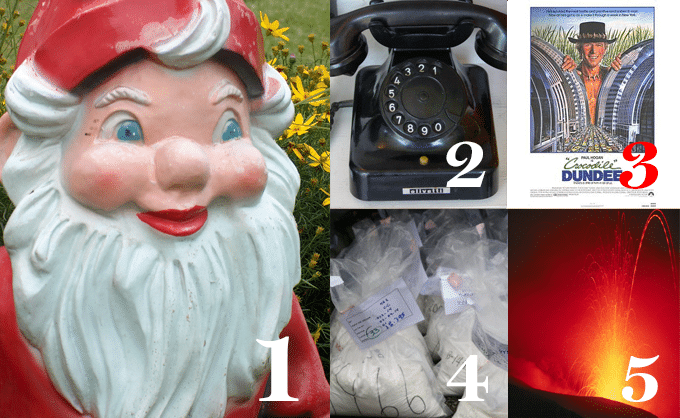Five things we learned last month

Photos: Wikinoby, Kornelia and Hartmut Häfele, Martin Mejia/AP/Press Association Images, Wolfgang Beyer
Issue #17 of Delayed Gratification is about to go on the presses and promises to be a good one: highlights include in-depth features revisiting the disappearance of 43 students in Mexico, North Korea’s Sony hack and the Ferguson shooting. We’ve got extraordinary photo shoots from the DRC, from the British campaign in Afghanistan and the Chinese city modeled on Paris, plus an infographic which definitively proves what the best country in the world is (spoiler alert: it’s not in Scandinavia).
We did a lot of research for the issue: here are five of our favourite new facts that we picked up in February.
1) Garden gnomes were introduced to the UK by Sir Charles Edmund Isham in the 1800s. They became wildly fashionable for a while but had fallen from grace by the turn of the 20th century and were banned from appearing in exhibits at the inaugural Chelsea Flower Show in 1913 as part of an umbrella ban on “brightly coloured mythical creatures”.
2) From the late 1950s onwards, so-called ‘phone phreakers’ hacked telephone networks by exploiting the internal system of tones used to route long-distance calls. The potential of phone phreaking was inadvertently discovered by Joe Engressia. Born blind and with absolute pitch, Engressia developed an obsession with phones in his early years. When he was seven, he discovered that he could disconnect phone calls by whistling into the phone at a certain pitch. He kept experimenting with the effects of whistling the 2,600 Hz tone into his telephone: by the time he was at university, he had cracked how to place free long-distance calls and was selling them to his friends for $1 a pop.
3) Critical approval of Crocodile Dundee dropped by 78 percentage points between its first and second instalment. While the original 1986 film mustered a Rotten Tomatoes score of 89 percent, the 1988 sequel – in which the outback hero takes on a Colombian drug cartel – garnered only 11 percent.
4) Over the past two decades, the street price of cocaine in the UK has halved, from $131 per gram in 1990 to $63 per gram in 2012. According to UN data, UK cocaine dealers are the cheapest in west and central Europe. Their Swedish counterparts charge as much as $147 per gram, making it the most expensive country to buy cocaine in the region.
5) In 1982, geologists Chris Newhall and Stephen Self developed the Volcanic Explosivity Index (VEI) to provide a taxonomy for volcanic eruptions. The index ranges from zero to eight, with a VEI score of eight referring to supervolcanic eruptions which spew out more than 1,000 cubic kilometres of ejecta. Scientists have identified a total of 47 supervolcanic eruptions in the history of the Earth, the most recent of which took place about 26,500 years ago at what is now New Zealand’s Lake Taupo.
Slow Journalism in your inbox, plus infographics, offers and more: sign up for the free DG newsletter. Sign me up
Thanks for signing up.





